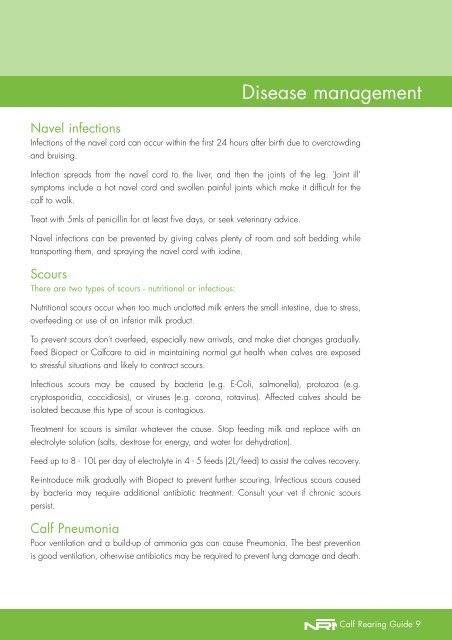Create successful ePaper yourself
Turn your PDF publications into a flip-book with our unique Google optimized e-Paper software.
Disease management<br />
Navel infections<br />
Infections of the navel cord can occur within the first 24 hours after birth due to overcrowding<br />
and bruising.<br />
Infection spreads from the navel cord to the liver, and then the joints of the leg. ‘Joint ill’<br />
symptoms include a hot navel cord and swollen painful joints which make it difficult for the<br />
calf to walk.<br />
Treat with 5mls of penicillin for at least five days, or seek veterinary advice.<br />
Navel infections can be prevented by giving calves plenty of room and soft bedding while<br />
transporting them, and spraying the navel cord with iodine.<br />
Scours<br />
There are two types of scours - nutritional or infectious:<br />
Nutritional scours occur when too much unclotted milk enters the small intestine, due to stress,<br />
overfeeding or use of an inferior milk product.<br />
To prevent scours don’t overfeed, especially new arrivals, and make diet changes gradually.<br />
Feed Biopect or <strong>Calf</strong>care to aid in maintaining normal gut health when calves are exposed<br />
to stressful situations and likely to contract scours.<br />
Infectious scours may be caused by bacteria (e.g. E-Coli, salmonella), protozoa (e.g.<br />
cryptosporidia, coccidiosis), or viruses (e.g. corona, rotavirus). Affected calves should be<br />
isolated because this type of scour is contagious.<br />
Treatment for scours is similar whatever the cause. Stop feeding milk and replace with an<br />
electrolyte solution (salts, dextrose for energy, and water for dehydration).<br />
Feed up to 8 - 10L per day of electrolyte in 4 - 5 feeds (2L/feed) to assist the calves recovery.<br />
Re-introduce milk gradually with Biopect to prevent further scouring. Infectious scours caused<br />
by bacteria may require additional antibiotic treatment. Consult your vet if chronic scours<br />
persist.<br />
<strong>Calf</strong> Pneumonia<br />
Poor ventilation and a build-up of ammonia gas can cause Pneumonia. The best prevention<br />
is good ventilation, otherwise antibiotics may be required to prevent lung damage and death.<br />
<strong>Calf</strong> <strong>Rearing</strong> <strong>Guide</strong> 9


